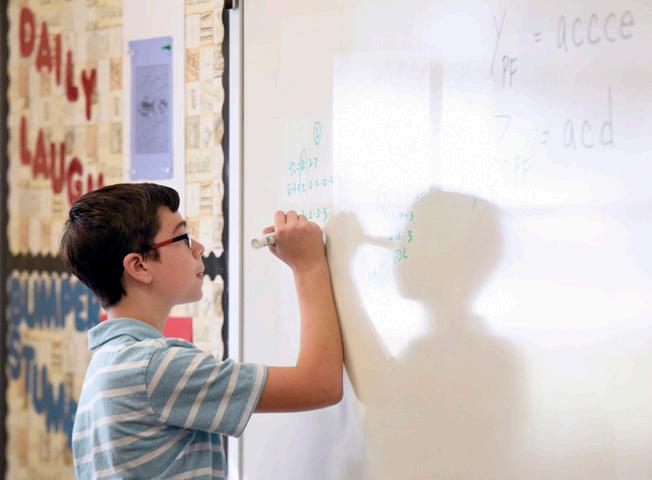
3 minute read
Mathematics
The Middle School Mathematics program consists of six interrelated courses, two per grade level, designed to meet the needs of students with a range of mathematical talents.
The Middle School Mathematics program consists of two levels within each grade in order to meet the needs of a range of mathematical talents. The two levels are referred to as “regular” and “enriched.” We choose to use the term enriched because we do not accelerate through the content. We prefer not to refer to our program as one with “tracking” because the movement between these two settings is fluid so we can place each student in the proper learning environment.
A good way to characterize the difference between the regular and enriched classes is to consider the type of teaching and the amount of guided practice provided. The enriched setting will include more exploration and there will be less directive teaching. The pace moves quickly and there is more in-depth discussion and application. In the regular setting, students will be given a more direct style of teaching and offered more guided practice to ensure their understanding.While the enriched classroom will delve deeper into the material while also moving slightly faster, there are only a few units where the regular curriculum differs from the enriched curriculum.

In that way, movement between the two levels is fluid as students do not have many gaps if they switch from one setting to another.
course of study 2022-2023
Grade 6 Conceptual Mathematics and Pre-Algebra (full year 5/6)
The sixth-grade experience ushers the students from the concreteoperational arithmetic toward the formal, abstract continuum of mathematics. Topics include some of the following units: complex order of operations, integer operations, set theory, non-measurement geometry, inequalities, probability, fractions, decimals, percents, proportions, and measurement geometry. Students may have the opportunity to look at Arabic art in compass constructions, laying the groundwork for geometric proofs while also using mathematics as a means to appreciate art and other cultures. Throughout the sixthgrade experience, we introduce the abstract representation with Algebraic expressions at an age-appropriate level. Additionally, we ask them to explain their thinking and justify their reasoning through a series of higherlevel thinking exercises.
Grade 7 Quantitative Literacy and Foundations of Algebra (full year 5/6)
The seventh-grade experience expounds on the concepts from the year before. With the addition of more strategic problem solving, students work on their quantitative literacy and explore the Rational number system by focusing on various statistics on real-world problems. They tackle three-dimensional geometry, explore Python computer programming, and expand their knowledge of probability by exploring permutations and combinations.. The enriched students will investigate finite systems in which 9+5=1. During this year, students begin to work on concepts in Algebra I including simplifying expressions, solving linear equations, algebraic inequalities, and graphing on the coordinate plane.
Grade 8 Algebra 1.5 (full year 5/6)
The eighth-grade experience is a robust Algebra I curriculum that prepares the students for Algebra II in the Upper School. It is beyond a regular Algebra I curriculum. Students solve and graph linear equations with greater complexity. They use graphing calculators to create linear regression models and explore quadratic functions. After mastering systems of equations, they tackle polynomials, factoring, solving quadratic equations, irrational numbers, and solving rational algebraic equations. They derive the quadratic formula, rationalize algebraic denominators, and start graphing quadratic equations.
Our program is spiraled throughout the three years so topics are revisited at an increasing level of complexity. Because we do not accelerate, our students are developmentally ready to master our three objectives: employ their arithmetic and algebraic skills to execute with accuracy, explore new topics at an intuitive level, and develop an appreciation for mathematics. Throughout the three grades, students are given open-ended problem-solving activities. Whether in partners or individually, they are required to write about their observations, propose solutions, and justify their answers. The eighth grade enriched students frequently complete robust weeklong assignments that require them to employ deductive and inductive reasoning to analyze a situation and create a formula to predict the outcome. Our hope is to produce students who can think strategically, collaborate with classmates, and confirm their answers so they can feel confident in their ability to tackle future endeavors.











